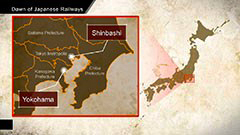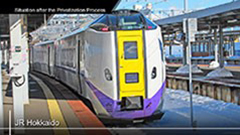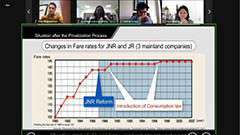The history of Japanese characteristic railways management

The first railway in Japan opened on 1872, connecting Shimbashi to Yokohama, a distance of 29 km.
JICA has performed JICA Knowledge Co-Creation Program "Urban Railways Management" for developing countries. This program has been continuing for over 10 years, and especially, the lecture about "The Privatization Process of Japanese National Railways" in the program has received more responses and high reputations from trainees.
The history of Japanese railways operation, which has a lot of experiences using private capital in a wide range from urban railways construction to management, is very characteristic in the world. In developing countries where huge funds are required for railway operation, sharing Japan's such rare experiences is very important.
At this time, we produced JICA-Net multimedia-based learning materials "The Privatization Process of Japanese National Railways and Its Impact" (Main Edition) (external link) and (Supplemental Edition)*" for counterparts and trainees in developing countries to learn a lot of Japan's experiences and examples of urban railways and get a hint to make the concrete plan improving urban railways management.
*Supplemental Edition is limited viewing to people who are engaged in JICA's projects. For more information, please contact us through JICA-Net Library Desk (eitpl-jicanet@jica.go.jp).
Show the results and problems of The Privatization Process of Japan National Railways
We produced the material divided into 2 parts: "Main Edition" and "Supplemental Edition".
Since its founding in 1949, Japanese National Railways or JNR played a major role as Japan's primary transportation after World War II.
"Main Edition" explains the background where JNR fell into the management crisis, the outline of the Privatization Process of JNR, and the circumstances and results after that, by using illustrations and pictures.

In Japan, there were the special circumstances that enabled to achieve the privatization.
"Supplemental Edition" focuses on the settlement of long-term debts and the employment of JNR workers that were major issues to be solved for the achievement of the reform, and also the special circumstances that enabled to achieve the privatization even though most of the urban railways in cities around the world were managed by public organizations.
In Japan, "The Privatization Process of JNR" is, in general, considered to be a success. However, its process had the other side that was not necessarily said "Everything succeeded", where there were the issues about long-term debts and employment.
Because it was a delicate matter in Japan, we needed to think out the way of arranging and showing it for overseas people who are involved with railways management.
As a result, we produced the material in 2 parts: "Main Edition" and "Supplemental Edition" to enable people to not only know "The outline and positive impact of the Privatization Process as a general theory" but also understand about "There were various issues and special circumstances in Japan if one dug deeper."
Used the material in JICA Knowledge Co-Creation Programs and the exhibition.

We used the material in JICA Knowledge Co-Creation Programs "Urban Railways Management"
We used the material actually in JICA Knowledge Co-Creation Programs "Urban Railways Management" in FY 2021, where about 15 trainees who were engaged in the urban railways' management in developing countries watched it.
Some trainees voiced their opinions such as "Learning Japan's experience was helpful for me when I struggled to consider how the way of railway management should be in my country.", "Though I thought the privatization was the best way, I found there were major difficulties and problems in the Privatization Process of JNR", and "I would like to use the material as a reference in order to think the management way that is fitted to my country, comparing to its circumstances and conditions."
As we intended firstly, we were able to produce the material that showed trainees the outlook and positive impact of the Privatization Process as a general theory in the main edition and also give them the understanding of Japan's issues and special circumstances that realized the Privatization Process in the supplemental edition.
We shared the material with trainees who returned to their own countries. We will use the material every year in the future.
We also screened the material at the exhibition of "Mass-Trans Innovation Japan 2021" (external link) in Makuhari Messe, from November 24th till 26th, 2021.
Because people who do not know "JNR" are increasing, the material is useful for Japanese who are involved with railway management and trainees in developing countries, for example, to train new employees in the company. Moreover, we will use the material widely at seminars and events in the project of JICA Technical Cooperation of public transportation.
NAKAZONO Miu
JICA Infrastructure Management Department
*The Material(s) mainly applied
The Privatization Process of Japanese National Railways and Its Impact
This material introduces the experience of the reform of Japan's National Railways (JNR) and its privatization process, which is essential to understand the method of Japan's urban railways management.
Since its opening in 1872, Japanese railways are said to have undergone three major changes in the operation systems. In this material, we will look back on the history leading up to the third change "JNR reform (division and corporatization)" which is said to have had the greatest impact, the changes due to the process, and convey Japan's experience in the field of urban railways. This material consists of two parts, the main edition (for general information) and the supplemental edition (for the details).
*Supplemental Edition is limited viewing to people who are engaged in JICA's projects. For more information, please contact us through JICA-Net Library Desk (eitpl-jicanet@jica.go.jp).




scroll